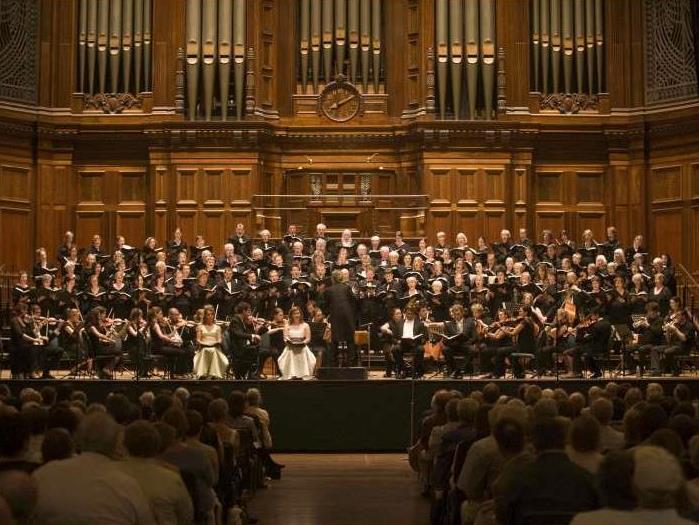Hearing the Royal Melbourne Philharmonic’s performance of Messiah, with a full choir and orchestra at the historic Melbourne Town Hall, recalled great Messiahs of the past. The soloists were in fine voice (and had dressed with a sense of occasion) and the conductor Andrew Wailes was authoritatively in charge of this great work.
It was welcome; however, to hear Messiah played at a suitable pace – not a dreary adagio as in the distant past but also not so presto that one could not appreciate the music. Wailes had the RMP Orchestra set the standard in a very precise Sinfonia to start, with even the dotted notes perfectly synchronised. The first of the soloists, tenor John Longmuir, delivered the first unaccompanied phrase ‘Comfort ye’ confidently, and was joined by the orchestra in ‘Every valley’ – a performance that showed why this aria is a favourite with Messiah audiences. This audience was clearly well educated in concert protocol, or they surely would have applauded.
The work is so vast in its emotional scope, let alone length, that it is possible only to mention some highlights.
The choir had its first chance to shine with ‘And the Glory’, taken at a brisk but not breakneck speed. Wailes had great control of the challenging polyphony that is a characteristic of the work – something that was borne out by every well-delivered chorus. The choir could have done with more sopranos (although that impression was gained by where we were sitting, very close to the front of the auditorium). Wailes gave particular attention to the tenors as the sopranos gained confidence.
Bass soloist Nathan Lay looked possibly too young to tackle ‘But who may abide’, in particular its challenging repetition of the phrase ‘I will shake’ – but every line was performed strongly and confidently. The chorus ‘And he shall purify’ had a good balance of parts, with a light touch on the reiterated first phrase and contrasting strength in ‘That they may offer’. There was even more light and shade later, in the aria ‘For darkness’. Accompaniment by the violins was well contained as Lay deftly negotiated the tortuous melodies.
Alto Sally-Anne Russell is always a popular choice for the solo role in Messiah – and once again showed why this is so. She has a mellow yet strong alto voice and clear articulation of the words – but, more importantly, a sense of the meaning of what she singing and attention to conveying the emotion and power in those words.
The soprano Stephanie Gibson has a quite operatic style that indicates the direction her career will take. But this reviewer particularly enjoyed Gibson’s partnership with Russell in the duet ‘He shall feed his flock’, and later, the solo ‘I know that my Redeemer liveth’ sung with clarity and conviction.
The first part of Messiah is very long and it does seem as if all concerned have had a workout. Part Two allows the focus to be on the orchestra for a short while and once again there was a fine precision especially on the dotted notes. Russell’s ‘He was despised’ was a highlight of her wonderful performance on the night, infused with feeling.
The chorus then had a number of items in which Wailes’ directorship of the choir was most evident, with polyphony controlled and words well articulated. Unlike the sheep they were singing about these singers certainly did not go astray!
A dramatic sequence in the work then followed, beginning with the tenor’s ‘All they that see him’. In response to the chorus ‘He trusted in God’ Longmuir delivered the recitative like a story, which made his aria ‘But Thou didst not leave’ all the more powerful. Part Three revealed the actor in Longmuir in ‘Thou shalt break them’, the great lead into the mighty Hallelujah Chorus. At the invitation of the conductor the audience rose, the organist took his place, trumpet and drum joined the orchestra and the choir gave a very satisfying and whole-hearted performance of this iconic core of Messiah.
Much more was to follow, of course, with highlights of the final part including the choruses since ‘Since by man came death’ and the bass recitative ‘Behold I show you a mystery’ followed by the stirring aria ‘The trumpet shall sound’. The work ended with the choir’s strong rendition of ‘Worthy is the lamb’ and the Amen.
Enthusiastic applause followed and the audience was rewarded with a reiteration of the Hallelujah Chorus. Again we stood to hear it, which meant there was a standing ovation when Wales finally laid down his baton. That was just as it should be after this enjoyable and fine performance.
Four and a half stars
Messiah
Melbourne Town Hall
8 December





